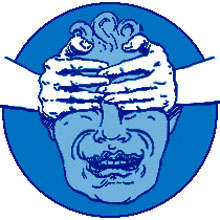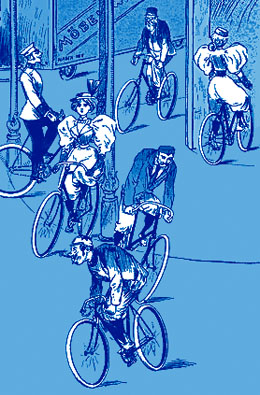|
|
 |
| My Favourite Planet > Blogs > Edwin Drood's Column > October 2010 |
 |
 |
back |
Edwin Drood's Column |
 |
12 October 2010 |
 |
| |
 |
| Betting the farm to win a chicken |
In which the Drood looks at the evolutionary value of the risk gene to see if there is any correlation between the behaviour of animals and the reprehensible utterances of the new mendocrats *.
 |
| |


Blinded, after A. Schmidhammer |
Apparently, if an element of risk is added, young men are more likely to make a hash of a decision than their elder peers. Testosterone leads to carelessness. Young company hot-shots may be fantastic at new ideas, brilliant at marketing, unstoppable when it comes to departmental productivity, but once they find the water over their heads, or if the stakes are scarily high, they are far more likely to lose their nerve and flunk the leveraged buyout, the eleventh hour merger, the aggressive acquisition than a man twice their age. However, notwithstanding this propensity for high-stakes failure, a youngster will generally choose the path that leads directly to risky decisions, while a cooler-headed man of mature years will rather choose the path that avoids such decisions having to be made, even though he would do a much better job of managing the process and meeting the challenge were it to appear. It’s a little like watching senior racing icon Derek Bell take the Continental Supersports out for a few laps of the Nurburgring. You know he’s no slouch even before he starts to pull on the fireproof romper-suit and the helmet, but you also know he’s not going to set the fastest lap time either. On the other hand the chances are pretty much zero that Mr Bell will end up wrapping £250k worth of ultimate Bentley around an oak tree on the Mullenbach Schleife. So what does this tell us about the evolutionary usefulness of the risk gene? |
| The loneliness of the long-distance leaper |
You might think it tells us that survival is for the softest rather than the fittest. You might think I’m trying to warn you off buying a ULM or hang-gliding off Annapurna. But no, actually it tells us that we should not lose sight of the rabbit. In other words, we shouldn’t let the mass at the centre of the bell curve and its attendant lesson-to-be-learned-on-risk-avoidance, blind us to the occasional brilliant leaper who succeeds phenomenally and represents not only the statistical outside chance, but also the very pinnacle of evolution and its purpose, namely: to win, even at the risk of one’s life and, by raising the stakes at the leading edge, ensure a more comfortable and safe existence for those of us living within the fat belly of the curve. On a darker note, the extreme colours and loud noise of the male mallard duck are part of a high-risk strategy to attract the fox’s attention away from the sweet little tawny female sitting on all those valuable eggs. He might go down the foxy hatch, but my word, he’ll look glorious doing it, such that nothing in his life will become him quite as well as the leaving of it. Evolution is not inherently about winners, but winning is definitely all about evolution. The higher the salmon can leap, the further upstream they can mate and spawn, the fitter the next generation will be for the extra time spent in a safer and less demanding fresh-water environment, the fatter and stronger they will become before returning to their spawning origins, the more eggs will be laid and fertilized. Thus extreme behaviour raises the average and improves the entire species. Something similar should be happening with bankers, stockbrokers, acquisitive CEOs and boy racers with barely street-legal Honda (un)Civics... it’s just rather hard in these cases to define the dividends for the rest of us.
 Because unfortunately, fringe behaviour cannot improve the average for the species unless it directly impinges upon some existential issue or value that is worth enhancing due to its acknowledged utility: more and better eggs, stronger salmon, penguins who can last longer without food, camels who can go further without a drink, bats with better radar and moths with fuzzier fur or even more erratic flight paths to avoid detection. The behaviour must relate to a greater good. Much of our leisure time risk-taking has lost all connection with the progress of the species. We are exercising a genetic imperative without the slightest idea of or concern for its relevance. While humanity might be improved by a probe to Venus, a solar flight round the world or discovering the North-East passage, it is unlikely to be advanced (or at least, not much) by some nutcase snow-boarding down K3 or a sad mid-lifer flying his new Ferrari and trophy girlfriend into the landscape. Sadly, along with those cited at the end of the last paragraph, there are plenty of other examples of the extreme behaviour gene in action today that clearly fail to advance us at all, and far from strengthening or securing the great average, instead lead even the mildest of us out onto the very slippery dance floor of devolution rather than onward and upward to evolution. |
| Mad hatters and tea parties |
| |



UN bicycle conspirators on the streets

After a drawing by E. Kneiss |
New political organizations are springing up again, just as they did in the 1920s, that are based on deliberate distortions, bare-faced lies and a willingness to say almost anything if there is someone out there stupid enough to believe it (a recent example from the Tea Party: schemes to encourage the use of bicycles in urban areas are a “United Nations plot to subvert the traditional American way of life”). These neo-con whackos are stretching the extreme envelope far beyond any limits of general utility. The actual “risk” that they are taking (such as losing the respect of those whose respect they neither have, nor could ever earn) by adopting such extreme positions is negligible. The possible “high-stakes” reward is the near certitude of buying into or otherwise accessing the perks generated by their nascent mendocracy **, should it ever come into power.
 That certain elements of the press and even some otherwise sane commentators are viewing this freak show as something essentially “healthy” (like old-school town hall debates or a high-fibre diet of grass-roots democracy), as a fresh, yet traditional, wind that is blowing away the accumulated cobwebs of cronyism and elitism, is a pathetic testimony to the dearth of analytical reasoning in much of today’s overheated media sphere. It is also compelling evidence of a growing modern prejudice against education and the merits of intellect that is fast becoming as endemic to the new dumbed-down middle class as it already was to the barbarian hoards ... who are not outside, by the way, but within our gates, not immigrant but indigenous.
 Adolf Hitler, who knew a thing or two about how to market extreme positions, said that one should tell big lies to the people, because they will always recognize a small lie (they tell themselves small lies every day) for what it is and reject it, but will swallow an absolute whopper unquestioningly, never once imagining that such a big statement could be untrue or that anyone would be so audaciously brazen as to make it up. The new patriotic movements are all “much of a muchness” in this respect and compete with one another for the honour of the biggest lie. Interestingly enough, Herr Hitler included this astonishing piece of candour in his book “Mein Kampf”, which replaced the Bible as the tome systematically given to newly married couples by town registrars in the Third Reich and which apparently, like its predecessor, was just as systematically ignored.
 * Mendocracy
* Mendocracy: a society built on lies
 ** Mendocrats ** Mendocrats: those who knowingly create and profit from such a system
© Edwin Drood, October 2010 |
|
Edwin Drood's Column, the blog by The Mysterious Edwin Drood,

at My Favourite Planet Blogs.
We welcome all considerate responses to this article
and all other blogs on My Favourite Planet.
Please get in contact. |
 |
Visit the My Favourite Planet Group on Facebook.

Join the group, write a message or comment,
post photos and videos, start a discussion... |
|
Views of blog authors do not necessarily reflect those of the publishers
or anyone else at, on or in the vicinity of My Favourite Planet. |
 |
 |
|
|
| |
| |
|
| |
 |
| |
 |
| |
 |
| |

George Alvanos

rooms
in Kavala's historic Panagia District

Anthemiou 35,
Kavala, Greece

kavalarooms.gr
 |
| |

Olive Garden Restaurant

Kastellorizo, Greece

+30 22460 49 109

kastellorizo.de
 |
| |

Papoutsis
Travel Agency

Kastellorizo, Greece

+30 22460 49 286

greeklodgings.gr
 |
| |
|